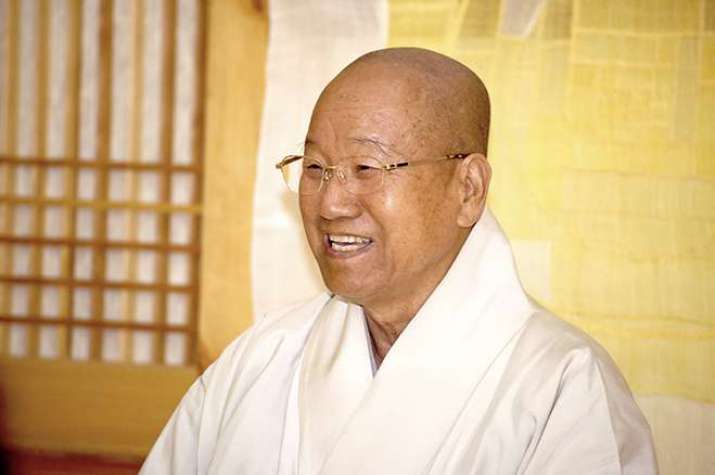
The Supreme Patriarch (or jongjeong, 종정) of the Jogye Order of Korean Buddhism, South Korea’s largest Buddhist order, stated during a recent sermon for observances marking the birthday of the Buddha, that the origins of the COVID-19 pandemic lie in “extreme” human greed and avarice, which has resulted in heedless development leading to widespread pollution and ecological mismanagement.
The Jogye Order is a school of Seon (Zen) Buddhism that traces its roots back 1,200 years to the Unified Silla (also known as the Later Silla) kingdom (668–935). The Jogye school as a distinct entity emerged in the late 11th century when the monk Bojo Jinul, credited as the school’s founder, sought to combine Seon practices with the theological underpinnings of sutra-based Buddhist schools, including Korean Pure Land Buddhism. The order now represents the largest segment of South Korea’s Buddhist population, administering about 1,900 active temples, more than 13,000 monastics, and seven million lay followers nationwide.
“The coronavirus disease that has broken out globally is the product of ecological destruction and pollution from mankind’s reckless development, and also extreme greed and avarice,” Ven. Jinje stated during a sermon released for the Jogye Order’s observances for the birthday of the Buddha.
This year, ceremonies and celebrations for the birthday of the Buddha—a public holiday in South Korea, known as Bucheonim Osin Nal (부처님 오신 날) meaning “the day the Buddha came,” and Seokga Tansinil (석가탄신일) or “the Buddha’s birthday”—were held on 30 May, having been postponed from 30 April because of the pandemic.*
Born in 1934, Ven. Jinje became a Buddhist monk at the age of 19. He is currently serving his second five-year term as jongjeong of the Jogye Order of Korean Buddhism, since first being elected March 2012 by the order’s 26-member senior council. The jongjeong is considered the foremost spiritual leader of the monastic order, although he bears no administrative responsibilities. Candidates for the office of the jongjeong must be over 70 years of age, with at least 45 years of experience as a monastic, and have been awarded the title daejongsa (대종사), meaning “most eminent monk.”
“Global handling of the pandemic has been futile, with the spiritual culture of the East attracting attention amid the helplessness shown by science [and] technology,” Ven. Jinje added, empasizing the Buddhist teaching of interconnection: “Heaven and Earth and I are all of one root. All beings are of one body. We cannot exist without our neighbors, nor can we live without stepping on the Earth.” (Yonhap News Agency)
South Korea has recently experienced an unexpected surge in clusters of COVID-19 cases, which have been linked to religious gatherings, nightclubs, and a logistics facility in the Seoul metropolitan area, since the government eased social-distancing restrictions on 6 May.
At the time of writing on 8 June, global confirmed COVID-19 infections were reported to have reached 7.02 million, with 402,852 deaths so far recorded and 3.14 million recovered.** The World Health Organization in March estimated the mortality rate from the virus, believed to have originated in Wuhan, China, at 3–4 per cent, based on incomplete and preliminary data, with the elderly and people with underlying health conditions considered most at risk. More recent data suggests that the mortality rate may be significantly lower, however studies are inconclusive due to variations in COVID-19 testing procedures in different countries, and differing methodologies for classifying and reporting COVID-19 as a cause of death.
The Korean government, which was one of the fastest in the world in its response to contain the local outbreak, has reported 11,814 confirmed cases of COVID-19 and 273 deaths, with 10,563 people reported to have recovered.
According to census data for 2015, the majority of South Korea’s population—56.1 per cent—holds no religious affiliation. Christians make up the largest religious segment of the population at 27.6 per cent, while Buddhists account for 15.5 per cent.
* Korean Buddhists Cancel Lotus Lantern Festival as Pandemic Caution Lingers (Buddhistdoor Global)
See more
Coronavirus result of reckless development, ecological destruction: Buddhist leader (Yonhap News Agency)
Supreme Patricarch of the Jogye Order of Korean Buddhism
Jogye Order of Korean Buddhism














